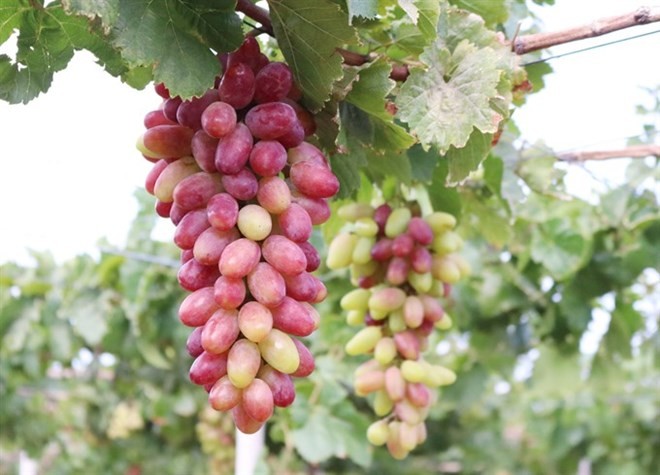
The south-central province, the country’s largest grape producer, has been growing the new variety on an experimental basis since 2013 on an area of 6ha and so has the neighboring province of Binh Thuan.
NH01 -152 was created by the province-based Nha Ho Research Institute for Cotton and Agriculture Development.
Phan Cong Kien, deputy head of the institute, said the department’s recognition would enable farmers to mass produce the grape and thus have a new high-quality variety. It would replace some old grape varieties now grown in the province, he said.
It produces an average yield of 15-18 tons per hectare in each of its two annual crops, according to the institute. It can be grown on many different types of soil, has a high fruiting rate and is highly disease-resistant.
Its fruit is large and has a slight fragrance, just one or two seeds and flesh that is slightly sweet, firm and crunchy and is meant mainly for eating fresh.
Traders buy the new grape fruit at VND100,000-120,000 ($4.3-5.2 a kilogram, two times the price of the red cardinal and NH01-48, two major grape varieties grown in Ninh Thuan.
Grape farming has been developing in Ninh Thuan in recent years with local authorities showing farmers advanced methods of growing the fruit, including using water-efficient irrigation.
Ninh Thuan gets the lowest rainfall in the country while half of the province’s grape growing area does not get water from irrigation works.
The provincial People’s Committee has instructed relevant agencies and localities to expand the area under grapes grown to Vietnamese good agricultural practice (VietGAP) standards.
Localities have been instructed to grow NH01 -152 in large-scale grape fields in Ninh Hai district’s Vinh Hai commune.
The province plans to expand grape orchards-related eco-tourism and promote the brand name of its grapes that are meant for eating fresh.
Households offering tourism services in their grape orchards are taught both how to grow to VietGAP standards and tourism-related skills.
In 2012, the province’s grape varieties were granted geographical indication (GI) certification by the National Office of Intellectual Property.
It has nearly 1,300ha under the fruit, 80 percent of it red cardinal and the rest other varieties, and an annual output of 30,000 tons.
























